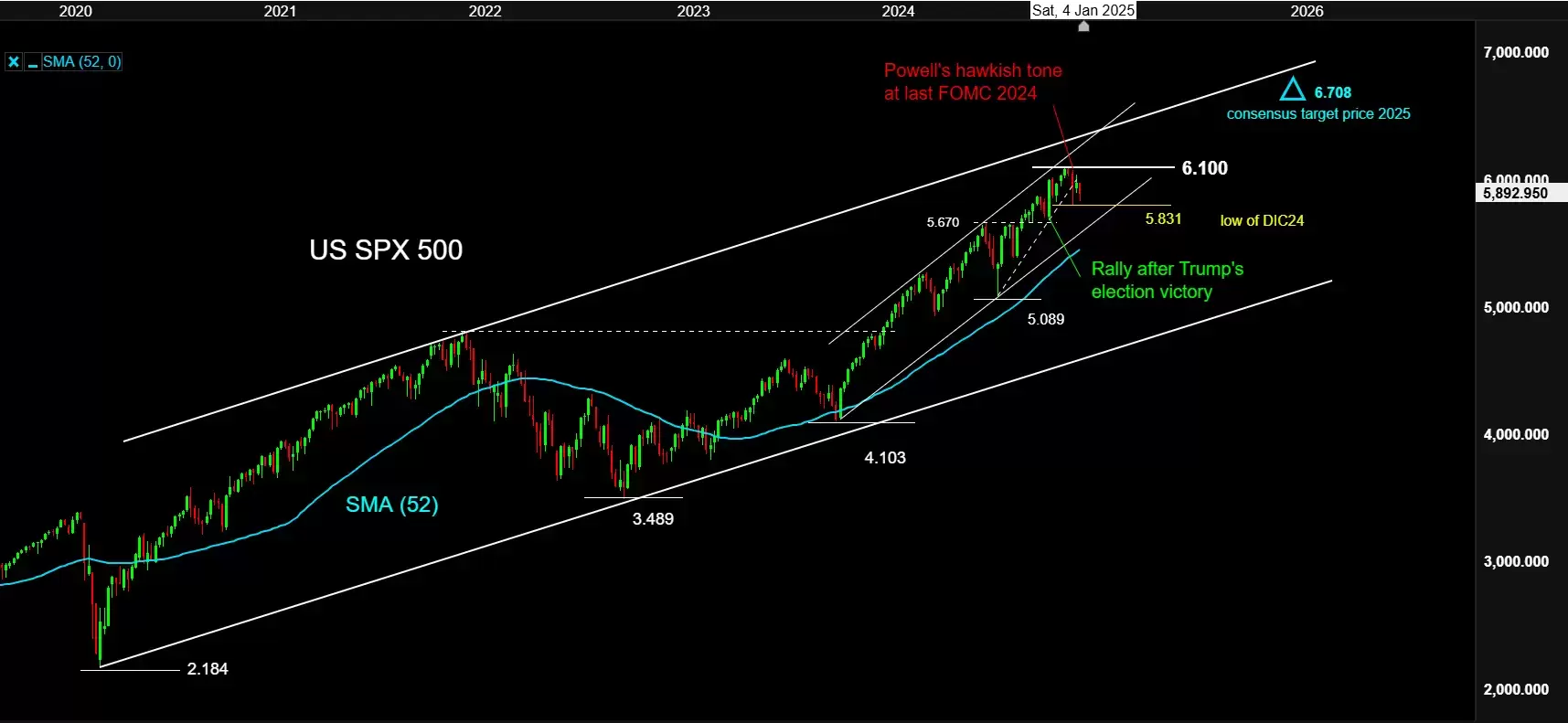
A bullish consensus on the S&P 500
According to consensus data compiled as of 31 December 2024, the average target price for the S&P 500 at the end of 2025 is 6,708.59 points, a potential upside of approximately 14% compared to its 2024 closing price. This figure matches the London Stock Exchange’s institutional brokers’ estimate system’s projected 14% earnings growth for S&P 500 companies in 2025. If both forecasts hold, the S&P 500's current price-earnings ratio (P/E) of 25.5x would remain stable, as earnings and prices would grow at the same rate.
A P/E of 25.5x for the S&P 500 would be 20.8% above its 10-year average and could be described as expensive, but is consistent with an anticipated economic expansion, as widely expected by consensus. The 14% projected gain for the index reflects this optimism, doubling the historical average annual return of 7.33% since 2000. This sentiment can also be seen in the recommendations received by S&P 500 companies; of the 12,168 recommendations issued, 54% are “buy”, 40.1% are “hold” and only 5.1% are “sell”.
Trump v Powell
Much of the market's optimism stems from expectations of “Trumpnomics” - lower taxes and a focus on American industry. The president-elect is expected to extend the 2017 Tax Cuts and Jobs Act and implement new tariff policies. However, several factors could stop the Trump steamroller, including inflationary pressures and US Federal Reserve chair Jerome Powell’s commitment to keeping interest rates high (if the economy does not weaken).

Doubts in the post-election year
2025 begins with some doubts despite market optimism and seasonal strength, with stock markets stagnant or reversing to the mean. Gains are driven by large megacorporations, and the market is focused on holding above December lows. The electoral cycle is another factor to consider; the post-election phase marks its most seasonally complicated part, with a higher risk of recession and weaker relative performance for indices.
A busy January
January brings several critical events that could shape market sentiment:
- 10 January: US jobs report for December 2024
- 15 January: US consumer price index report for December 2024
- 15 January: The start of corporate earnings season for Q4 2024
- 20 January: Donald Trump’s inauguration
- 29 January: The Federal Open Market Committee’s first monetary policy meeting of 2025
- 31 January: US personal consumption expenditures report for December 2024
The S&P 500 holding above its December lows over January would be a potentially bullish signal. However, the month’s various financial announcements could cause the index to break below December lows, potentially signalling a challenging year ahead.
Disclaimer: CMC Markets is an execution-only service provider. The material (whether or not it states any opinions) is for general information purposes only, and does not take into account your personal circumstances or objectives. Nothing in this material is (or should be considered to be) financial, investment or other advice on which reliance should be placed. No opinion given in the material constitutes a recommendation by CMC Markets or the author that any particular investment, security, transaction or investment strategy is suitable for any specific person. The material has not been prepared in accordance with legal requirements designed to promote the independence of investment research. Although we are not specifically prevented from dealing before providing this material, we do not seek to take advantage of the material prior to its dissemination.






















